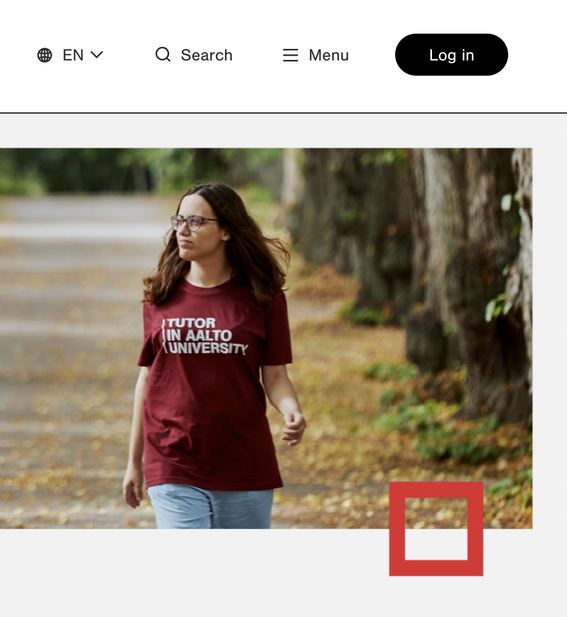Help us improve the new search at aalto.fi
Learn what this new feature is about and provide feedback on how to improve it.
The internal search at the Aalto University website uses Elastic. This is a popular search engine that provides flexibility to add new features and implement changes over time. We are going to concentrate on some topics key to Elastic. Based on these, you will have a great deal of information to ensure the visibility of your content on aalto.fi searches.
Weighting is a critical part in ranking search results. Individual entities within page content types (eg. hub, news), basic information (eg. title, summary) and metadata (eg. tags, relates to) at aalto.fi have all different weightings, which can be changed at any time. Different weightings have been tested after the integration of Elastic. Currently, page titles have a significantly bigger impact on search results compared to the rest. This means that your keywords should probably be reflected on the page title in order to gain visibility.
| Entity | Type | Weighting |
|---|---|---|
| Page title (headline) | Basic information | 8 |
| Hubs | Content type | 8 |
| Lead text | Basic information | 2 |
| News/events posted within the last 3 months | Content type | 2 |
| Summary | Basic information | 1 |
| Primary/Secondary tags | Metadata | 1 |
| Others | 1 or less |
Aalto.fi search has the ability to find content regardless of typos. In the previous search function at aalto.fi a typo would provide unsuccessful results. The fuzziness feature under Elastic automatically corrects typos and finds the content. This also applies to searches where a single word is typed with a space in between and vice versa.
Example: coronavirus is a word used on Aalto University website. A search of the term 'corona virus' would provide the same results as coronavirus, since the system would understand the fuzziness.
Stemming is the process of reducing a word to its root form. So you do not necessarily have to write a word in its different forms because the system will recognise the root of the word through stemming.
Example: root word ‘connect’ can be mapped to words connection, connections, connective, connected, and connecting.
Note that stemming is not always working to perfection, especially in Finnish language. Therefore, make sure you test the visibility of your content in searches when typing different words with the same root form.
Some users search content with synonyms of the keywords leading to the content they are looking for. In order to make sure that those searches yield correct results, lists of synonyms are built for each of the three available languages at the Aalto University website (Finnish, English, Swedish). Creating synonyms is a very effective way to point users to the right content. To add terms to the lists, editors can send a request to communications@aalto.fi.
Example: the 'Open positions' page is one of the most visited at Aalto University. However, words used in searches such as jobs, careers or vacancies resulted in unsuccessful results. Once those words were added to the synonym list and linked to 'Open positions', searches started to yield the right results.
Despite all the efforts made to ensure a higher visibility of content, some cases show that relevant searches do not yield desired results. This might happen if popular keywords are used in the headline on many different pages, or when fuzziness and stemming do not work to perfection. In those cases, pinning can result in a very effective tool to bring individual pages to the top of the search results for specific search terms. Therefore, pages can be pinned to the top under certain search queries. Editors can send a request to communications@aalto.fi in order to link one or more terms to a specific page.
Example: There are many events organised by different Aalto University instances. Some of them have separate pages such as event repositories. Therefore, many different pages in the Aalto University website contain the keyword Events in the headline. This is problematic if you carry out a search including the term 'Events'. In order to bring the Aalto University Event hub page to the top of those searches, pinning is the appropriate tool to do so.

Some pages at aalto.fi are visible for the Aalto Community only. It is for that reason that some searches are unsuccessful if logged-out from the system. Even if some content is on top of search results for logged-in users, logged-out users will not be able to see it. This typically applies to searches about services for personnel and profiles displayed for Aalto Community only. In those cases, no pages show in the search results and therefore it prevents logged-out internal users from finding the desired content. Automatic login works on campus if you are connected to the Aalto network, but only away from it upon VPN use.
Some words such as prepositions or conjunctions are ignored by the search engine. Meaning that even if users type those words, the system will not take them into account. There is one single custom stop word in all languages: Aalto. Some stop words in English include: and, be, but, for, not, is, the etc.
When typing several words in the search field, the system uses the so-called AND operator. In practice, this means that all the words in the search field have to match the page content. AND will narrow down the search to display fewer results, since it tells the search engine that the results have to include every single one of the search words typed in.
On many occasions, users might not be pleased with the search results provided. This can be due to a combination of different factors which some of them are explained below. Remember that you can always refine your search to get more accurate results.

Learn what this new feature is about and provide feedback on how to improve it.

Boost your webpages with search engine optimisation (SEO). Read on!